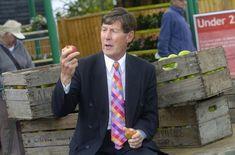

A Scottish collector has united with the Prince of Wales and the Co-operative Group for an attempt to save 1,000 varieties of rare British apples.
Geoffrey Anderton, who owns Lochnaw Castle in Stranraer, has bought 1,000 historic varieties, and identical collections have been purchased by the Duchy of Cornwall and the Co-op.
The heritage apples include such emotive names as Bloody Ploughman, which originated at the Carse of Gowrie, in Perthshire, Fairie Queen, Forty Shillings and Ducks Bill, originating in England, and Great Expectations, which was first bred in Ireland.
A decision on where to plant the varieties will be made by September, and the Co-op plans to introduce the apples into its stores, planting the trees with the aim of pressing and blending the fruit for an own-brand juice.
English Apples and Pears chief executive Adrian Barlow welcomed the initiative, saying: "It is vital that these historic English apple varieties are retained and I am delighted that the Co-operative, the Prince of Wales and a private collector will be establishing additional collections of these trees."
The UK climate is ideally suited to producing apples, and hundreds of varieties had been raised from the early eighteenth century, he said.
Barlow added: "It is essential that they are preserved for possible use in breeding in the future, and hence the importance of the National Collection at Brogdale and these new plantings.
"It is great that the Co-operative has agreed to plant a thousand trees of these varieties, which will provide an additional insurance that they will not be lost, whilst offering shoppers the opportunity to taste some of the juice from these remarkable apples."
William Barnett, who heads up the Co-op's 800-acre operation at Tillington, Herefordshire, where the apple trees are being planted, said: "Some of the apples date back to pre-Victorian times. They were originally dessert apples but became less fashionable and failed as modern commercial varieties.
"They were in danger of passing into history but we wanted to preserve them and keep the varieties alive by finding a commercial use for them. It's a very exciting project, with a small first pressing planned for later this year."



